- News
- Reviews
- Bikes
- Accessories
- Accessories - misc
- Computer mounts
- Bags
- Bar ends
- Bike bags & cases
- Bottle cages
- Bottles
- Cameras
- Car racks
- Child seats
- Computers
- Glasses
- GPS units
- Helmets
- Lights - front
- Lights - rear
- Lights - sets
- Locks
- Mirrors
- Mudguards
- Racks
- Pumps & CO2 inflators
- Puncture kits
- Reflectives
- Smart watches
- Stands and racks
- Trailers
- Clothing
- Components
- Bar tape & grips
- Bottom brackets
- Brake & gear cables
- Brake & STI levers
- Brake pads & spares
- Brakes
- Cassettes & freewheels
- Chains
- Chainsets & chainrings
- Derailleurs - front
- Derailleurs - rear
- Forks
- Gear levers & shifters
- Groupsets
- Handlebars & extensions
- Headsets
- Hubs
- Inner tubes
- Pedals
- Quick releases & skewers
- Saddles
- Seatposts
- Stems
- Wheels
- Tyres
- Health, fitness and nutrition
- Tools and workshop
- Miscellaneous
- Cross country mountain bikes
- Tubeless valves
- Buyers Guides
- Features
- Forum
- Recommends
- Podcast
review
£50.00
VERDICT:
Impressive attempt to give the sport a definitive reference book for the year
Weight:
1,990g
Contact:
At road.cc every product is thoroughly tested for as long as it takes to get a proper insight into how well it works. Our reviewers are experienced cyclists that we trust to be objective. While we strive to ensure that opinions expressed are backed up by facts, reviews are by their nature an informed opinion, not a definitive verdict. We don't intentionally try to break anything (except locks) but we do try to look for weak points in any design. The overall score is not just an average of the other scores: it reflects both a product's function and value – with value determined by how a product compares with items of similar spec, quality, and price.
What the road.cc scores meanGood scores are more common than bad, because fortunately good products are more common than bad.
- Exceptional
- Excellent
- Very Good
- Good
- Quite good
- Average
- Not so good
- Poor
- Bad
- Appalling
The Road Book is essentially a statistical summary of the 2018 professional cycling season, with many added extras. Whether it is a long overdue and welcome arrival, or an idea that has no relevance today, only time will tell. Either way, it does a fine job of delivering on the promise to be 'the first ever comprehensive cycling almanack'.
- Pros: Provides cycling with the same authoritative reference book as some other sports
- Cons: It might make you regret that no-one did this years ago
It is tempting to summarise this book as being a 'Wisden for cycling', and stop there; while true, the editor probably wouldn't want to pay me for that, so I will elaborate.
The Wisden Cricketers' Almanack is an obvious comparison, as is the Football Yearbook, and The Road Book publishers have obviously learned a lot about what makes those publications successful.
There have been some other attempts to produce a similar book for cycling over the years, but from what I can tell they have not been as comprehensive as The Road Book, nor in English, and most have now fallen by the wayside – with the annual Flemish publication Velo being one of those still going.
Some will question the relevance of such a publication in an increasingly digital age, but there is good evidence that digital books are no longer taking share from print books, with both co-existing after having found their place in the market. Not only that, the fall in the number of bookshops on the high street may have levelled off.
I believe there will always be a place for reference books alongside internet searches. For me, print and electronic media each offer a different experience, with neither always being better than the other: you don't discover information in the same way on each format.
Cillian Kelly is described as 'a renowned statistician', has 'a reputation for being a good source of unusual cycling statistics' and his 'day job involves lots of maths and computer code' – which sounds like just the sort of person you need for a job like this.
Let's look at what you get in this inaugural almanack.
The bulk of the book comprises race results for all senior professional road races and time trials in 2018, listing the results for WorldTour, .HC, and .1 races – essentially this is any event that a WorldTour-level rider could ride, male or female. That is a lot of races.
For 'lesser races', placings are given down to 20th, plus the top 3 of GC and any other classifications. This is accompanied by a brief weather report, which is more of a challenge than it sounds: first you have to acquire the basic information from weather services, and then you have to summarise the conditions for an event that can last for hours and move around a lot. That's a lot of work for such a small feature, but it is information that you will struggle to find easily elsewhere.
For WorldTour races, there is also a paragraph or two of supporting text – and a route profile is included. Again, it is a lot of work for so little information, as every race organiser uses a different horizontal and vertical scale – so each profile was re-worked to a standard set of parameters.
As if his task was not hard enough already, Kelly also wanted to include information on the riders involved in the main breakaways of WorldTour events. Not only is there a subjective judgement as to what counts as a break, but you need to capture the names of all the riders involved.
Kelly managed to partly automate the data collection by writing a program that trawled through race reports and pulled out riders' names, but that still had to be checked manually. Other sources include official Twitter feeds, and if all else failed he would watch television coverage.
The information steps up another level for Grand Tours, Monuments, and World Championships, with every finisher listed for each day's racing.
There is a complete listing of past winners for key races, which of course opens up a whole new area for debate: for example, the decision was taken to put an asterisk beside Lance Armstrong's name for his seven 'non-wins' in the Tour de France, and leave him out of the rankings for overall victory. However, his results do contribute to the analysis of which race number 'has been on the back of most Tour de France winners': the answer is 1 by a long way, which is normally the defending champion, and not 51 as is often thought – and Armstrong's removal wouldn't change the result.
Kelly also analyses some of his statistics, and discovers that 'only 59 riders raced a Grand Tour for the first time in 2018, the lowest – significantly so – in the past 30 years'. He attributes this to the reduced team sizes, which means that every rider chosen needs to be a proven performer.
That is already a lot of statistics – but it is not all of them, with senior National Championship results from across the world and British race results also included. Other information includes team listings (with commentary) and obituaries.
A worthwhile almanack needs to provide more than just facts and figures, which The Road Book does. A panel of former riders and other worthies formed a judging panel for the initial 'Rider of the year' awards: Geraint Thomas and Anna van der Breggen were their overall winners, although they 'only' finished 4th and 3rd respectively in the UCI WorldTour rankings – which are also listed in full. Other winners were Egan Bernal and Laura Stigger as young winners, and Julian Alaphilippe and Amanda Spratt as 'combative' winners – which are all sound choices.
They invited 'a curator to present the images that illustrate some of the key stories of the previous season on the road', and the first selection (of 31 colour pictures) come from Rouleur magazine.
Editor Ned Boulting has used his extensive list of contacts to come up with six writers to contribute 'long-form' essays, which would be right at home in the finest cycling magazines. Some are well known for their writing, others less so – but who better to talk about whether Marianne Vos is past her peak than Marianne herself (albeit with some help)? Although she says 'I don't think I will win another rainbow jersey', that might just be a ruse to deceive her rivals because 'that is not to say I won't be working very hard to become world champion again'.
There are shorter contributions from Chris Froome, who describes the moment when he knew that he had won this year's Giro d'Italia, and Geraint Thomas, who does the same for his Tour de France win.
I have every confidence in Kelly and his sources, but with a proof-reading task of this magnitude there could be some mistakes, and if so the plan is to provide updates on the website – and then print a summary of any corrections in the next edition of the book.
Do you need such a book? For most people the answer is of course 'no'. Do you want such a book? It may be irrational, but for some the answer will always be 'yes'. I suspect that books like this are appreciated even more as time passes; to put it another way, I would welcome the chance to have Road Books that covered the years when I first became interested in the sport.
The print run of 3,000 pieces will determine the maximum number of complete sets available in future years – and you might want to be part of that select group. For comparison, Wisden produces well over 50,000 copies per year, with rare editions costing as much as a decent car, and complete sets cost as much as a decent house! Obviously, given that Wisden started 155 years ago, The Road Book has a long way to go to achieve the same status, but it has to start somewhere.
Verdict
Impressive attempt to give the sport a definitive reference book for the year
road.cc test report
Make and model: The Road Book Cycling Almanack
Size tested: 878pp
Tell us what the product is for and who it's aimed at. What do the manufacturers say about it? How does that compare to your own feelings about it?
From The Road Book:
The world's most compelling sport finally gets the chronicle it deserves. The Road Book is a landmark publication, containing a comprehensive review of the year's racing, from the first World Tour race of the year (the Tour Down Under) to the last (the Tour of Guangxi).
The three Grand Tours, five Monuments and the World Championships all receive lavish attention, across one thousand original pages of reports and statistics, as do the UCI Women's World Tour events. Other major races are also covered with an impressive array of data.
This was an extraordinary year. But in that regard, it was quite normal...
In his introduction, Editor Ned Boulting addresses the key issues facing this 'beautiful and chaotic, captivating and maddening, thrilling and stultifying' sport, and there is a wealth of exclusive essays from the cream of cycling writing:
* Chad Haga on his Giro d'Italia
* Harry Pearson on the mystery of Niki Terpstra
* Philippa York on Geraint Thomas' Cinderella Story
* Morten Okbo on British dominance
* Marianne Vos and Helen Pidd on Vos' spectacular return to winning ways.
* Tom Southam on the life of a directeur sportif.
Both a thrilling reminder of the crucial moments of the season just gone (just where was it that Simon Yates cracked? And who did Van Vleuten beat on the line?) and an indispensable companion to the season to come (which comes first: the Poggio or Cipressa?), The Road Book will enhance every serious fan's enjoyment of the sport.
Tell us some more about the technical aspects of the product?
Title: The Road Book
Author: Ned Boulting and Cillian Kelly
Publisher: The Road Book Ltd
Date: 2/11/18
Format: Hardback
Pages: 878
ISBN: 9781916484900
Price: £50
Rate the product for value:
8/10
Although £50 is a lot of money, it gets you a lot of book
Tell us what you particularly liked about the product
That it now exists.
Tell us what you particularly disliked about the product
That it has not existed before.
Did you enjoy using the product? Yes
Would you consider buying the product? Yes
Would you recommend the product to a friend? Yes, subject to knowing his or her interests.
Use this box to explain your overall score
It would be trite to call this best-in-class, because there is nothing else quite like it – but it does its job well and I think that it would be hard for anyone to improve on it.
About the tester
Age: 59
I usually ride: My best bike is:
I've been riding for: Over 20 years I ride: Most days I would class myself as: Expert
I regularly do the following types of riding: touring, club rides, sportives, general fitness riding






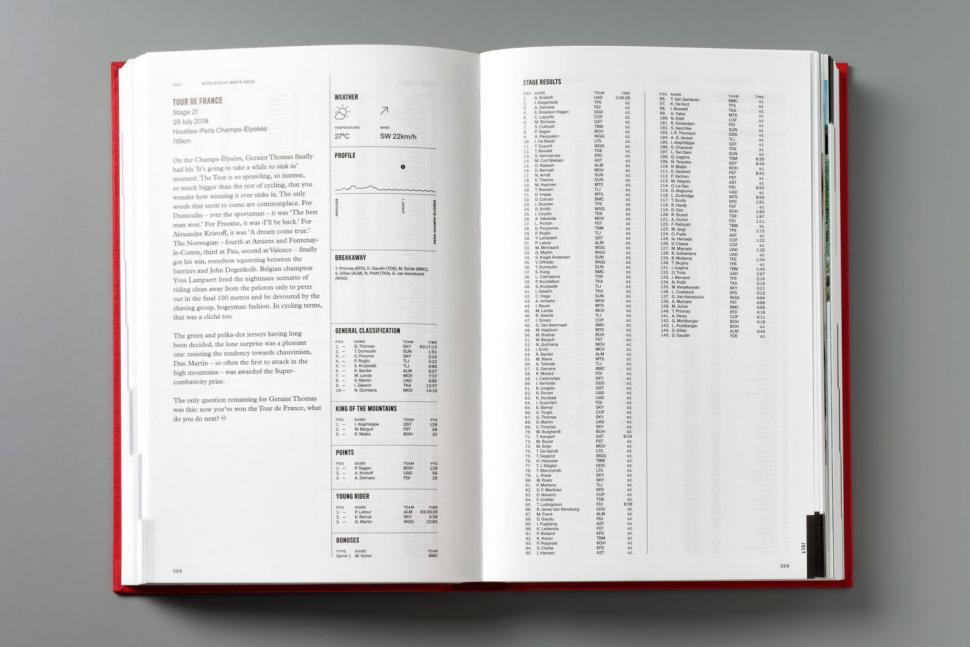

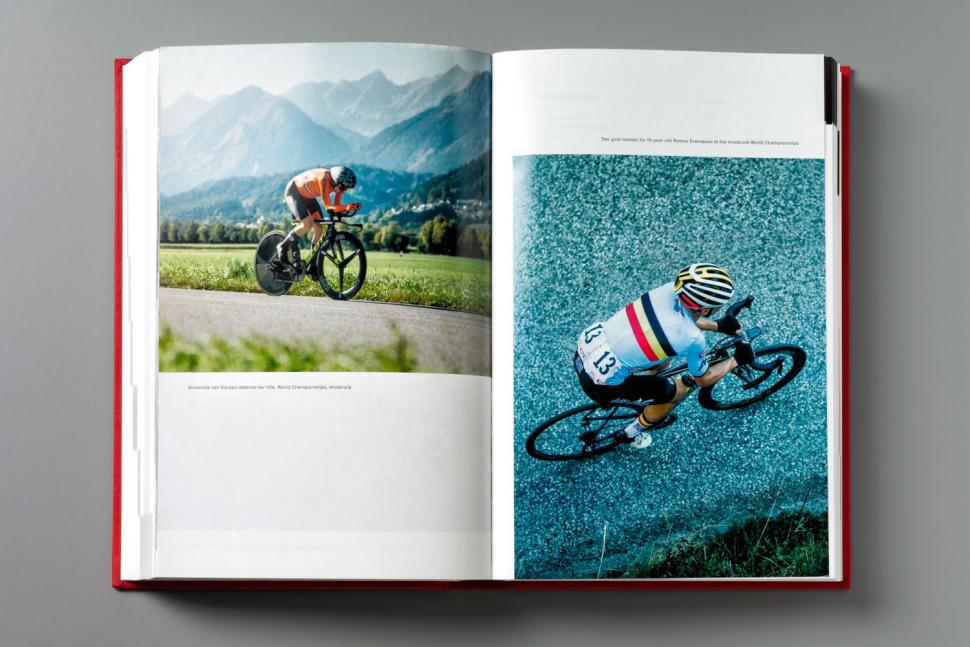

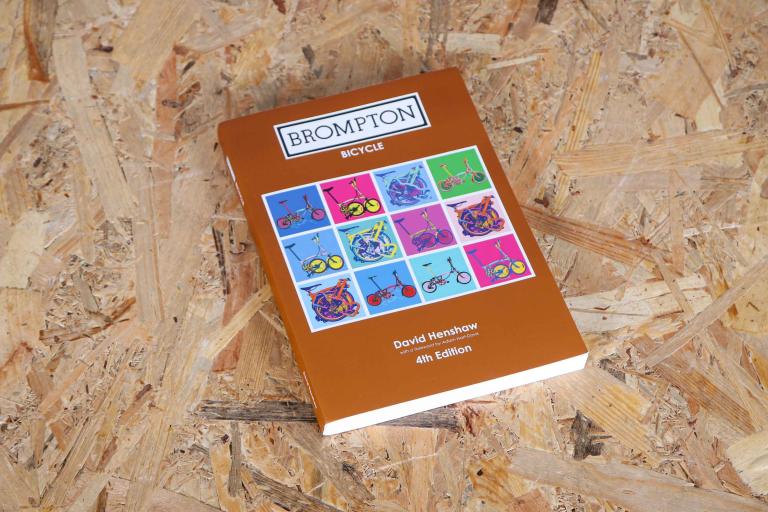
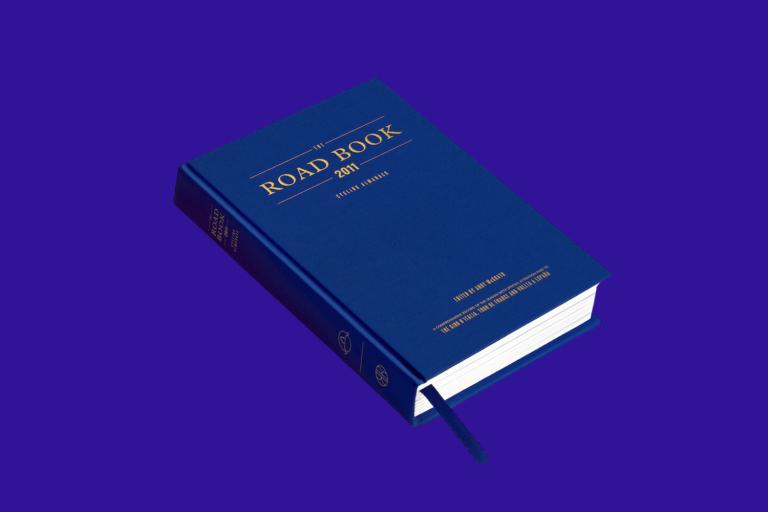
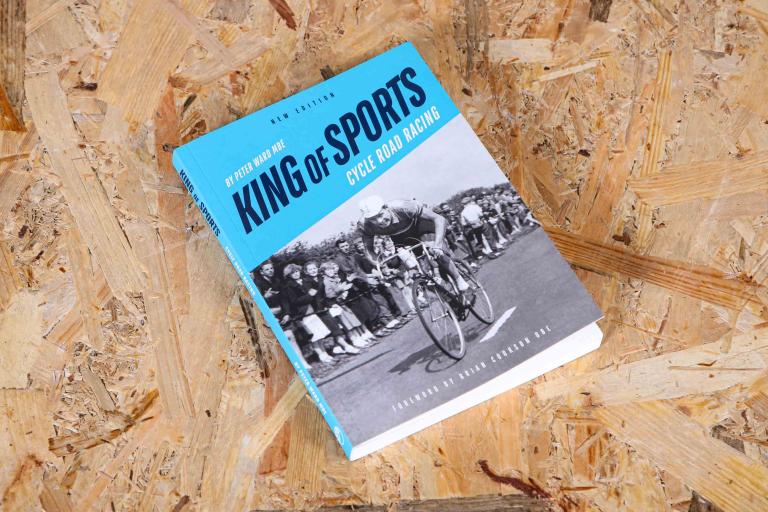
Whilst I don't doubt your experience, it's not mine; dogs off the lead are a huge problem in central London parks, with many owners seemingly happy...
Having the TdF riders winding up and down Arthur's Seat would be awesome actually, they could start on the cobbles in the old town, go up Arthur's...
I think there could be a whole other thread there... per your post on the funnies of the US vs. Switzerland. (Or possibly a report to government...
Even funnier/more annoying (I lean towards funnier as I'm not really bothered about KOMs, mainly because I hardly ever get near them) is the fact...
Yes, but she won't actually have to take them to court unless they dispute what constitutes reasonable compensation. Was your driver convicted of...
Now where's the fun in being logical?...
I don't know how I can make it any more clear, so I will just repeat myself: "'I was not saying counterbalance isn't a thing"....
Looks a little bit like they stated "exclusive" to me...
Ah, but they're used by crims! Feckless yoof probably dealing / stealing when they're not wheelying down the roads or pavements (is it them that...
I realised some time back, that if I was running a bit late at work and needed to get a wriggle on to catch the train, that I make up most time on...